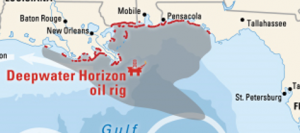Deepwater Horizon: Tragedy or Opportunity?
A reflection on Dr. Larry Nielsen’s seminar. By Kelley Anderson
The Deepwater Horizon BP Oil Spill is thought to be one of the worst environmental disasters in United States history. But was it truly as grave a disaster as we think?
Dr. Larry Nielsen, recently retired Alumni Distinguished Undergraduate Professor from North Carolina State University isn’t so sure. He began his career as a faculty member at Virginia Tech in 1977 and has succeeded in many different roles since then. These include Department Head of Fisheries and Wildlife Sciences at Virginia Tech, Director of the School of Forest Resources at Penn State, and Dean of the College of Natural Resources, Executive Vice Chancellor, and Provost at N.C. State. He has over 100 publications including four textbooks, a memoir of his time as Provost, and a biography titled “Natures Allies” about eight significant conservation leaders in our history. His seminar about the BP Oil Spill certainly turned heads and shed a new light on the spill and its impacts.
On April 20th, 2010, an oil platform in the Gulf of Mexico started experiencing problems when a methane bubble got caught in the pipe and eventually surfaced on the top of the platform. Once the bubble reached the surface a simple spark was all it took to send the platform up in flames. The platform burned for 36 hours and eventually sank. Many thought the tragedy was over; however, on April 24th BP sent a remote vehicle to explore the sunken platform and discovered all three blowout preventers had failed, causing millions of gallons of oil to steadily gush into the ocean. Several attempts were made to stop the oil from escaping the pipe, and were finally successful on July 15th – 87 days after the leak had begun.

A total of 134 million gallons were spewed into the Gulf of Mexico. Surely this must be the largest oil spill in history…right? Wrong- the BP Oil Spill comes in 5th place preceded by the Kuwaiti oil fires (44,000 million gallons), Lakeview gusher (378 million), Gulf War oil spill (250 million), and the Ixtoc I (140 million).
Although not the largest oil spill, the Deepwater Horizon caught the attention of people all over the world. Who was to blame for such an egregious mistake? Dr. Nielsen says we are. Our addiction to oil, specifically in the United States, and our want for resource independence from foreign nations is what caused this spill. The United States houses 4.5% of the world’s population and consumes roughly 25% of the oil. This oil must come from somewhere, and the Gulf of Mexico is an oil oasis with over 3500 active U.S. oil platforms.
In terms of total oil pollution in the United States, almost 62% comes from natural seeps through cracks in the earth’s crust. Only 1% is caused by spills when extracting the oil (i.e. the BP oil spill), and nearly 32% of oil pollution stems from our consumption of oil (i.e. runoff and misuse).
The impacts this oil had on wildlife, while substantial, did not seem to have long term negative effects. Of the bird species affected by the spill, many were quite common and of least concern according to the IUCN. Sea turtles were also affected, but the habitats damaged by the oil were not uniquely important, and the pre-existing turtle sanctuaries in the area were able to rehabilitate and relocate over 14,676 turtles. Shrimp catches, perhaps the most valuable fishery, returned to normal levels within one year. Tourism was negatively impacted but has significantly grown every year since 2010. This is partially credited to BP spending more than $150 million on marketing efforts for the Gulf States. BP also provided $8.8 billion for wetland habitat restoration, which is more money than this field has ever been granted. Although there were impacts from the oil spill, it also created a unique opportunity for the promotion of Gulf State’s beaches, awareness of environmental problems facing wetlands and other sensitive areas, and an influx of money used to restore and rehabilitate damaged ecosystems.
So, was the Deepwater Horizon BP Oil Spill one of the worst environmental disasters in history? Or was is more of a bump in the road?
 0
0
